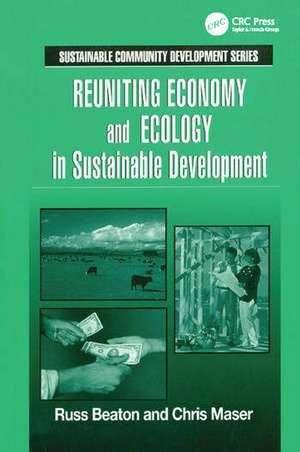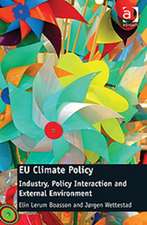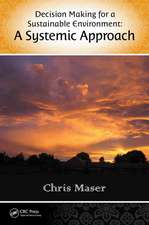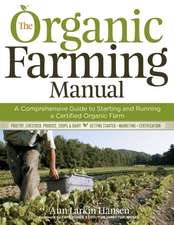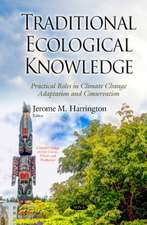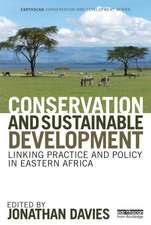Reuniting Economy and Ecology in Sustainable Development: Sustainable Community Development
Autor Charles R. Beaton, Chris Maseren Limba Engleză Hardback – 15 aug 2017
The vision put forth in this book is one of melding ecology and economy into a unifying concept of social-environmental sustainability. The author suggests that dividing ecology and economy conceptually will destroy society as we know it. Our task as adults is to repair the environment for the children who must inherit it.
The link between economics and ecology and the immense potential of that connection to influence the process of change within communities is the focus of this book. The authors theorize that in a healthy, future-oriented community there is a dominant role for sustainability. Each of these four concepts - economics, ecology, community and sustainability - are intimidating on their own. There has been volumes written on each topic separately but very little written on how they are connected in relation to the environment.
Reuniting Economy and Ecology makes those connections and provides a base for finding solutions to achieving sustainable communities.
| Toate formatele și edițiile | Preț | Express |
|---|---|---|
| Paperback (1) | 364.18 lei 6-8 săpt. | |
| CRC Press – 16 mar 1999 | 364.18 lei 6-8 săpt. | |
| Hardback (1) | 209.80 lei 6-8 săpt. | |
| CRC Press – 15 aug 2017 | 209.80 lei 6-8 săpt. |
Preț: 209.80 lei
Preț vechi: 364.17 lei
-42% Nou
Puncte Express: 315
Preț estimativ în valută:
40.16€ • 41.76$ • 33.65£
40.16€ • 41.76$ • 33.65£
Carte tipărită la comandă
Livrare economică 13-27 martie
Preluare comenzi: 021 569.72.76
Specificații
ISBN-13: 9781138418851
ISBN-10: 1138418854
Pagini: 118
Dimensiuni: 152 x 229 x 13 mm
Greutate: 0.45 kg
Ediția:1
Editura: CRC Press
Colecția CRC Press
Seria Sustainable Community Development
ISBN-10: 1138418854
Pagini: 118
Dimensiuni: 152 x 229 x 13 mm
Greutate: 0.45 kg
Ediția:1
Editura: CRC Press
Colecția CRC Press
Seria Sustainable Community Development
Public țintă
ProfessionalCuprins
Editor's Note -- Authors -- 1 Origins of Sustainability -- Beginning Perspectives -- Modern Origins of the Growth Debate -- The Problem and Its Crisis -- Science and the Natural World -- Questioning the Economics of Growth -- The Institutional and Political Imperative -- Toward a Philosophy of Sufficiency -- Summarizing and Looking Forward -- 2 Economics from the Ground Up -- Background -- In Search of Community Economic Theory -- Some Historic Economic Phases -- Cave Economics -- Tribal Economics -- Village Economics -- City Economics -- National Economics -- Global Economics -- Summing Up -- 3 Visioning^ Countings and Valuing -- Two Economic Visions -- The Throughput Economy -- Resource Endowments -- Waste Disposal -- The Spaceship Earth Model -- Assessing the Scorecard -- Three Problems with Gross Domestic Product -- Attempting to Change -- The Language of Values -- Two Broad Categories -- Alternative World Views -- The Pyramid of Values -- Demand and Values—A Final Note -- 4 Recognizing the Growth Ethic in Your Community -- Economics of Looking at Your Community -- What Are the Costs of Growth? -- Who Pays and Who Benefits? -- Recognizing the Rhetoric -- Prosperity Begins at Home -- Don't You Appreciate Cultural Diversity? -- Think of Your Children -- Livability and the Price of Housing -- The Landowner as King -- Slow versus Rapid Growth -- Conclusion -- A Personal Note -- 5 Recycling in Theory and Practice -- Recycling in Practice -- Recycling as Impossibility-Irreversibility -- The Symbolism of Recycling -- An Example: Seeing Things Whole -- Extracting the Principles -- 6 Toward Practical Use of Sustainability -- A Citizen’s Simulation -- Practical Difficulties with Conceptual Sustainability -- Why Does It Matter? -- The Political “Middle Way” -- Marginal Sustainability -- 7 Globalization and Sustainability -- Globalization Is Here, Now, and Real -- Profits: The Driving Force Behind Globalization -- Prospecting for Profits -- Financial Feeding Frenzy -- The Defense of Globalization -- Sustainability versus Globalization -- Endnotes -- Bibliography.
Notă biografică
Russ Beaton is Professor of Economics at Willamette University in Salem, Oregon. He co-authored Oregon’s nationally recognized legislation on land-use planning and has long been involved, both as researcher and citizen, in affairs dealing with energy, the environment, land use, and local and regional economic issues. He has authored studies on timber, agriculture, and urban growth. Among other topics typical of a liberal arts college faculty member, he teaches energy economics, environmental economics, and a course titled “Regional Economics and the Economy of Oregon.” Russ lives in Salem, Oregon, and intends to spend the rest of his career involved with issues surrounding the notion of sustainability. . Chris Maser spent over 20 years as a research scientist in natural history and ecology in forest, shrub steppe, subarctic, desert, and coastal settings. Trained primarily as a vertebrate zoologist, he was a research mammalogist in Nubia, Egypt (1963-64) with the Yale University Peabody Museum Prehistoric Expedition and was a research mammalogist in Nepal (1966— 67) for the U.S. Naval Medical Research Unit #3 based in Cairo, Egypt, where he participated in a study of tick-borne diseases. He conducted a three-year (1970-73) ecological survey of the Oregon coast for the University of Puget Sound, Tacoma, Washington. He was a research ecologist with the U.S. Department of the Interior, Bureau of Land Management, for 12 years (1975-87), the last 8 years studying old-growth forests in western Oregon, and a landscape ecologist with the Environmental Protection Agency for a year (1990-91). Today he is an independent author as well as an international lecturer and a facilitator in resolving environmental disputes, vision statements, and sustainable community development. He is also an international consultant in forest ecology and sustainable forestry practices. He has written over 260 publications, including the following books: Forest Primeval: The Natural History of an Ancient Forest (1989, listed in the School Library Journal as best science and technical book of 1989), Global Imperative: Harmonizing Culture and Nature (1992), Sustainable Forestry: Philosophy, Science, and Economics (1994), From the Forest to the Sea: The Ecology of Wood in Streams, Rivers, Estuaries, and Oceans (1994, with James R. Sedell), Resolving Environmental Conflict: Towards Sustainable Community Development (1996), Sustainable Community Development: Principles and Concepts (1997), Setting the Stage for Sustainability: A Citizen's Handbook (1998, with Russ Beaton and Kevin Smith), and Vision and Leadership in Sustainable Development (1999). Although he has worked in Canada, Egypt, France, Germany, Japan, Malaysia, Nepal, Slovakia, and Switzerland, he calls Corvallis, Oregon, home.
Descriere
Focuses on the link between economics and ecology and the immense potential of that connection to influence the process of change within communities. This work theorizes that in a healthy, future-oriented community there is a dominant role for sustainability. It provides a base for finding solutions to achieving sustainable communities.
